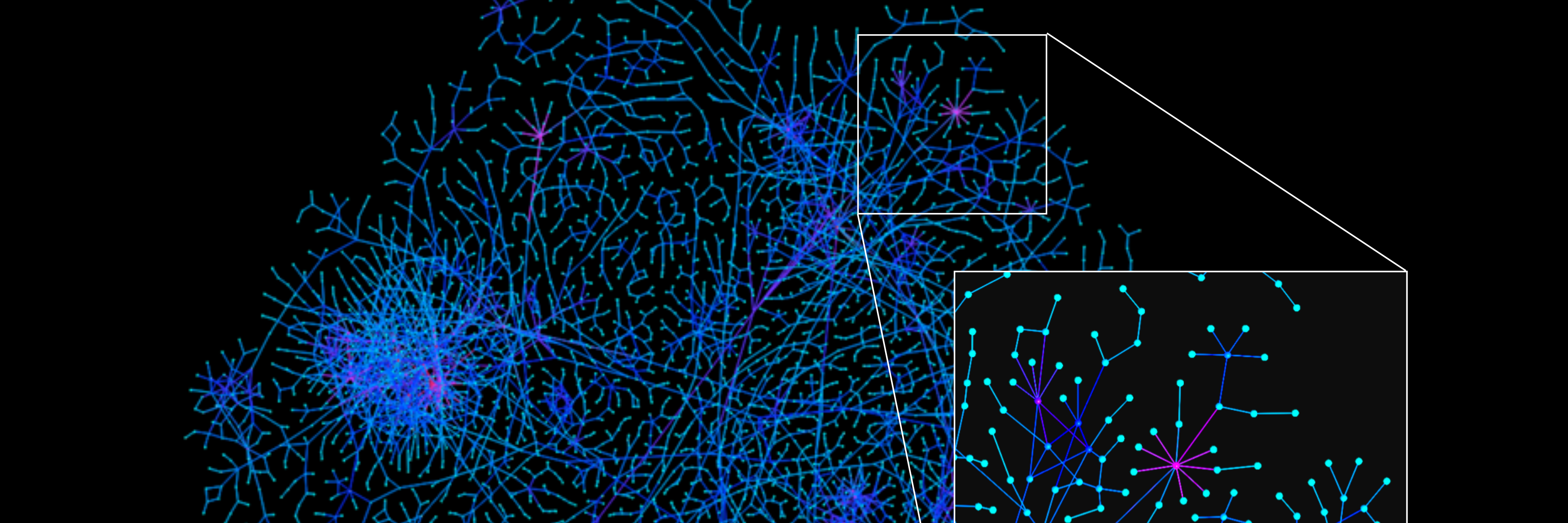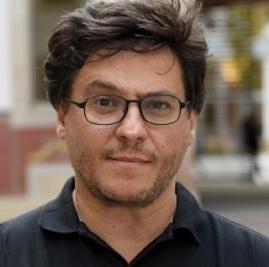Sistemas complejos
The Complex Systems lab focuses on understanding the evolutionary origins of complex systems, using both mathematical models and experimental approaches based on synthetic biology. This lab has proposed and developed the concept of Major Synthetic Transitions as a framework for exploring the origins of innovation in evolution using a parallel approach, namely our potential for building or simulating synthetic systems that can recreate past evolutionary events. This includes the origin of protocells, multicellular systems, symbiosis, cognition and language. Another research area addresses Unstable Evolutionary Dynamics, namely the dynamics of biological systems (particularly RNA viruses and cancer) that exhibit a tendency towards high genetic instability as part of their adaptation potential. The Complex Systems lab also introduced the concept of "Terraforming" endangered or human-made ecosystems to avoid catastrophic shifts. The success of this proposal will require the development of a new synthesis involving multiple scales and conceptual frameworks, ranging from synthetic biology and cellular circuits to ecological communities. Finally, it also studies the evolution of artificial systems, in both silico ecosystems and technological networks, in its search for a true definition of evolutionary dynamics and technological phylogenies.
Lab website: Complex Systems Lab
Solé R, Amor DR, Valverde S. 2016. On singularities and black holes in combination-driven models of technological innovation networks. PLoS ONE, 11(1):1-13. DOI:10.1371/journal.pone.0146180
Solé R, Amor DR, Duran-Nebreda S, Conde-Pueyo N, Carbonell-Ballestero M, Montañez R. 2016. Synthetic collective intelligence. BioSystems, 148:47-61. DOI:10.1016/j.biosystems.2016.01.002
Solé R. 2016. The major synthetic evolutionary transitions. Philosophical Transactions of the Royal Society B: Biological Sciences, 371(1701). DOI:10.1098/rstb.2016.0175
Solé R. 2016. Synthetic transitions: Towards a new synthesis. Philosophical Transactions of the Royal Society B: Biological Sciences, 371(1701). DOI:10.1098/rstb.2015.0438
Ollé-Vila A, Duran-Nebreda S, Conde-Pueyo N, Montañez R, Solé R. 2016. A morphospace for synthetic organs and organoids: the possible and the actual. Integrative Biology (United Kingdom, 8(4):485-503. DOI:10.1039/c5ib00324e
Macia J, Manzoni R, Conde N, Urrios A, de Nadal E, Solé R, Posas F. 2016. Implementation of Complex Biological Logic Circuits Using Spatially Distributed Multicellular Consortia. PLoS Computational Biology, 12(2):1-24. DOI:10.1371/journal.pcbi.1004685
Duran-Nebreda S, Bonforti A, Montañez R, Valverde S, Solé R. 2016. Emergence of proto-organisms from bistable stochastic differentiation and adhesion. Journal of the Royal Society Interface, 13(117). DOI:10.1098/rsif.2016.0108
Duran-Nebreda S, Solé R V. 2016. Toward Synthetic Spatial Patterns in Engineered Cell Populations with Chemotaxis. ACS Synthetic Biology, 5(7):654-661. DOI:10.1021/acssynbio.5b00254
de Lorenzo V, Marlière P, Solé R. 2016. Bioremediation at a global scale: from the test tube to planet Earth. Microbial Biotechnology, 9(5):618-625. DOI:10.1111/1751-7915.12399
Carbonell-Ballestero M, Garcia-Ramallo E, Montañez R, Rodriguez-Caso C, Macía J. 2016. Dealing with the genetic load in bacterial synthetic biology circuits: Convergences with the Ohm’s law. Nucleic Acids Research, 44(1):496-507. DOI:10.1093/nar/gkv1280
Bonforti A, Duran-Nebreda S, Montañez R, Solé R. 2016. Spatial self-organization in hybrid models of multicellular adhesion. Chaos, 26(10). DOI:10.1063/1.4965992
Valverde S, Sole RV. 2015. Punctuated equilibrium in the large-scale evolution of programming languages. Journal of the Royal Society Interface, 12(107). DOI:10.1098/rsif.2015.0249
Valverde S, Solé RV. 2015. A cultural diffusion model for the rise and fall of programming languages. Human Biology, 87(3):224-234. DOI:10.13110/humanbiology.87.3.0224
Valverde S, Ohse S, Turalska M, West BJ, Garcia-Ojalvo J. 2015. Structural determinants of criticality in biological networks. Frontiers in Physiology, 6(may):1-9. DOI:10.3389/fphys.2015.00127
Solé R. 2015. Bioengineering the biosphere? Ecological Complexity, 22:40-49. DOI:10.1016/j.ecocom.2015.01.005
Solé RV, Montañez R, Duran-Nebreda S. 2015. Synthetic circuit designs for earth terraformation. Biology Direct, 10(1):1-10. DOI:10.1186/s13062-015-0064-7
Shirt-Ediss B, Solé R V, Ruiz-Mirazo K. 2015. Emergent chemical behavior in variable-volume protocells. Life, 5(1):181-211. DOI:10.3390/life5010181
Seoane LF, Solé R. 2015. Phase transitions in Pareto optimal complex networks. Physical Review E - Statistical, Nonlinear, and Soft Matter Physics, 92(3):1-12. DOI:10.1103/PhysRevE.92.032807
Sardanyés J, Bonforti A, Conde N, Solé R, Macia J. 2015. Computational implementation of a tunable multicellular memory circuit for engineered eukaryotic consortia. Frontiers in Physiology, 6(oct):1-13. DOI:10.3389/fphys.2015.00281
Sardanyés J, Rodrigues C, Januário C, Martins N, Gil-Gómez G, Duarte J. 2015. Activation of effector immune cells promotes tumor stochastic extinction: A homotopy analysis approach. Applied Mathematics and Computation, 252:484-495. DOI:10.1016/j.amc.2014.12.005
Guillamon A, Fontich E, Sardanyés J. 2015. Bifurcations analysis of oscillating hypercycles. Journal of Theoretical Biology, 387:23-30. DOI:10.1016/j.jtbi.2015.09.018
Duarte J, Rodrigues C, Januário C, Martins N, Sardanyés J. 2015. How Complex, Probable, and Predictable is Genetically Driven Red Queen Chaos?. Acta Biotheoretica, 63(4):341-361. DOI:10.1007/s10441-015-9254-z
Avena-Koenigsberger A, Goñi J, Soleeé R, Sporns O. 2015. Network morphospace. Journal of the Royal Society Interface, 12(103). DOI:10.1098/rsif.2014.0881
Solé R V., Valverde S, Rodriguez-Caso C, Sardanyés J. 2014. Can a minimal replicating construct be identified as the embodiment of cancer?. BioEssays, 36(5):503-512. DOI:10.1002/bies.201300098
Shirt-Ediss B, Ruiz-Mirazo K, Mavelli F, Solé R V. 2014. Modelling lipid competition dynamics in heterogeneous protocell populations. Scientific Reports, 4. DOI:10.1038/srep05675
Sardanyés J, Simó C, Martínez R, Solé R V., Elena SF. 2014. Variability in mutational fitness effects prevents full lethal transitions in large quasispecies populations. Scientific Reports, 4. DOI:10.1038/srep04625
Macia J, Sole R. 2014. How to make a synthetic multicellular computer. PLoS ONE, 9(2). DOI:10.1371/journal.pone.0081248
Hillung J, Cuevas JM, Valverde S, Elena SF. 2014. Experimental evolution of an emerging plant virus in host genotypes that differ in their susceptibility to infection. Evolution, 68(9):2467-2480. DOI:10.1111/evo.12458
Gautrais J, Buhl J, Valverde S, Kuntz P, Theraulaz G. 2014. The role of colony size on tunnel branching morphogenesis in ant nests. PLoS ONE, 9(10):1-11. DOI:10.1371/journal.pone.0109436
Corominas-Murtra B, Fortuny J, Solé R V. 2014. Towards a mathematical theory of meaningful communication. Scientific Reports, 4:1-8. DOI:10.1038/srep04587
Carbonell-Ballestero M, Duran-Nebreda S, Montañez R, Solé R, Macía J, Rodríguez-Caso C. 2014. A bottom-up characterization of transfer functions for synthetic biology designs: Lessons from enzymology. Nucleic Acids Research, 42(22):14060-14069. DOI:10.1093/nar/gku964
Azzurro E, Tuset VM, Lombarte A, Maynou F, Simberloff D, Rodríguez-Pérez A, Solé RV. 2014. External morphology explains the success of biological invasions. Ecology Letters, 17(11):1455-1463. DOI:10.1111/ele.12351
Amor DR, Solé R V. 2014. Catastrophic shifts and lethal thresholds in a propagating front model of unstable tumor progression. Physical Review E - Statistical, Nonlinear, and Soft Matter Physics, 90(2):1-11. DOI:10.1103/PhysRevE.90.022710
Amor DR, Fort J. 2014. Cohabitation reaction-diffusion model for virus focal infections. Physica A: Statistical Mechanics and its Applications, 416:611-619. DOI:10.1016/j.physa.2014.08.023
Zwart MP, Pijlman GP, Sardanyés J, Duarte J, Januário C, Elena SF. 2013. Complex dynamics of defective interfering baculoviruses during serial passage in insect cells. Journal of Biological Physics, 39(2):327-342. DOI:10.1007/s10867-013-9317-9
Weitz JS, Poisot T, Meyer JR, Flores CO, Valverde S, Sullivan MB, Hochberg ME. 2013. Phage-bacteria infection networks. Trends in Microbiology, 21(2):82-91. DOI:10.1016/j.tim.2012.11.003
Valverde S, Solé R V. 2013. Networks and the city. Architectural Design, 83(4):112-119. DOI:10.1002/ad.1627
Solé R V., Valverde S. 2013. Before the Endless Forms: Embodied Model of Transition from Single Cells to Aggregates to Ecosystem Engineering. PLoS ONE, 8(4). DOI:10.1371/journal.pone.0059664
Solé R V., Valverde S. 2013. Macroevolution in silico: Scales, constraints and universals. Palaeontology, 56(6):1327-1340. DOI:10.1111/pala.12047
Solé R V., Macia J. 2013. Expanding the landscape of biological computation with synthetic multicellular consortia. Natural Computing, 12(4):485-497. DOI:10.1007/s11047-013-9380-y
Solé R V., Valverde S, Casals MR, Kauffman SA, Farmer D, Eldredge N. 2013. The evolutionary ecology of technological innovations. Complexity, 18(4):15-27. DOI:10.1002/cplx.21436
Seoane LF, Solé RV. 2013. A multiobjective optimization approach to statistical mechanics. Cornell University Library
Rodríguez-Caso C. 2013. Can cell mortality determine division of labor in tissue organization?. Journal of Theoretical Biology, 332:161-170. DOI:10.1016/j.jtbi.2013.05.001
Otero-Espinar M V., Seoane LF, Nieto JJ, Mira J. 2013. An analytic solution of a model of language competition with bilingualism and interlinguistic similarity. Physica D: Nonlinear Phenomena, 264:17-26. DOI:10.1016/j.physd.2013.08.011
Fort J, Solé R V. 2013. Accelerated tumor invasion under non-isotropic cell dispersal in glioblastomas. New Journal of Physics, 15. DOI:10.1088/1367-2630/15/5/055001
Duarte J, Januário C, Rodrigues C, Sardanyés J. 2013. Topological complexity and predictability in the dynamics of a tumor growth model with Shilnikov’s chaos. International Journal of Bifurcation and Chaos, 23(7). DOI:10.1142/S0218127413501241
Corominas-Murtra B, Goñi J, Solé R V., Rodríguez-Caso C. 2013. On the origins of hierarchy in complex networks. Proceedings of the National Academy of Sciences of the United States of America, 110(33):13316-13321. DOI:10.1073/pnas.1300832110
Widder S, Solé R, Macía J. 2012. Evolvability of feed-forward loop architecture biases its abundance in transcription networks. BMC Systems Biology, 6. DOI:10.1186/1752-0509-6-7
Valverde S, Solé R V, Elena SF. 2012. Evolved modular epistasis in artificial organisms. Artificial Life 13: Proceedings of the 13th International Conference on the Simulation and Synthesis of Living Systems, ALIFE 2012. 111-115. DOI:10.7551/978-0-262-31050-5-ch016
Macía J, Posas F, Solé R V. 2012. Distributed computation: The new wave of synthetic biology devices. Trends in Biotechnology, 30(6):342-349. DOI:10.1016/j.tibtech.2012.03.006


